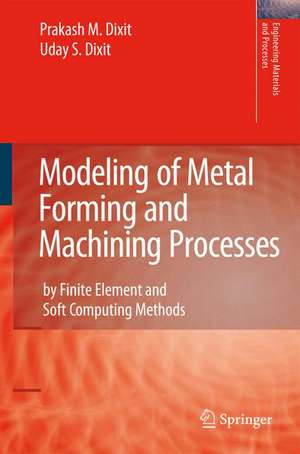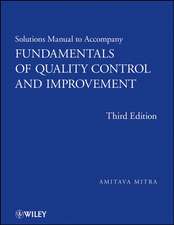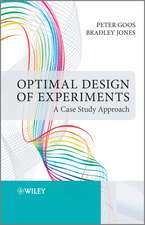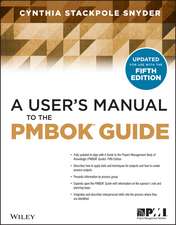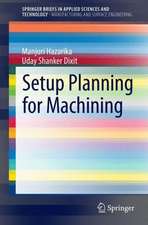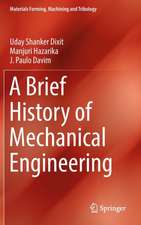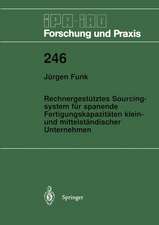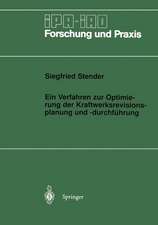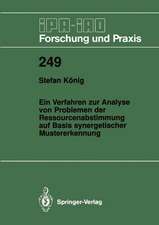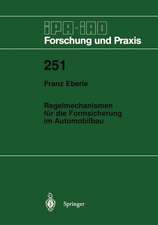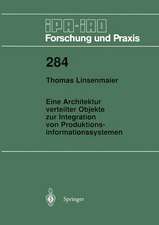Modeling of Metal Forming and Machining Processes: by Finite Element and Soft Computing Methods: Engineering Materials and Processes
Autor Prakash Mahadeo Dixit, U. S. Dixiten Limba Engleză Hardback – 23 mai 2008
| Toate formatele și edițiile | Preț | Express |
|---|---|---|
| Paperback (1) | 1231.47 lei 6-8 săpt. | |
| SPRINGER LONDON – 22 oct 2010 | 1231.47 lei 6-8 săpt. | |
| Hardback (1) | 1237.80 lei 6-8 săpt. | |
| SPRINGER LONDON – 23 mai 2008 | 1237.80 lei 6-8 săpt. |
Din seria Engineering Materials and Processes
-
 Preț: 397.54 lei
Preț: 397.54 lei - 18%
 Preț: 1237.93 lei
Preț: 1237.93 lei - 18%
 Preț: 950.52 lei
Preț: 950.52 lei - 15%
 Preț: 646.30 lei
Preț: 646.30 lei - 18%
 Preț: 1383.00 lei
Preț: 1383.00 lei - 18%
 Preț: 1826.07 lei
Preț: 1826.07 lei - 5%
 Preț: 676.35 lei
Preț: 676.35 lei - 18%
 Preț: 1228.62 lei
Preț: 1228.62 lei - 15%
 Preț: 644.95 lei
Preț: 644.95 lei - 15%
 Preț: 636.63 lei
Preț: 636.63 lei - 18%
 Preț: 1217.41 lei
Preț: 1217.41 lei - 20%
 Preț: 337.00 lei
Preț: 337.00 lei - 20%
 Preț: 557.21 lei
Preț: 557.21 lei - 15%
 Preț: 644.18 lei
Preț: 644.18 lei - 18%
 Preț: 956.50 lei
Preț: 956.50 lei - 18%
 Preț: 781.31 lei
Preț: 781.31 lei - 15%
 Preț: 640.06 lei
Preț: 640.06 lei - 23%
 Preț: 691.73 lei
Preț: 691.73 lei - 18%
 Preț: 941.50 lei
Preț: 941.50 lei - 18%
 Preț: 945.30 lei
Preț: 945.30 lei - 18%
 Preț: 952.09 lei
Preț: 952.09 lei - 15%
 Preț: 635.31 lei
Preț: 635.31 lei - 18%
 Preț: 1383.81 lei
Preț: 1383.81 lei - 15%
 Preț: 644.95 lei
Preț: 644.95 lei - 18%
 Preț: 1222.45 lei
Preț: 1222.45 lei - 18%
 Preț: 1322.04 lei
Preț: 1322.04 lei - 18%
 Preț: 945.30 lei
Preț: 945.30 lei - 15%
 Preț: 640.02 lei
Preț: 640.02 lei - 18%
 Preț: 1545.72 lei
Preț: 1545.72 lei - 24%
 Preț: 848.85 lei
Preț: 848.85 lei - 18%
 Preț: 937.05 lei
Preț: 937.05 lei - 18%
 Preț: 1115.14 lei
Preț: 1115.14 lei - 15%
 Preț: 632.55 lei
Preț: 632.55 lei - 18%
 Preț: 948.79 lei
Preț: 948.79 lei
Preț: 1237.80 lei
Preț vechi: 1509.51 lei
-18% Nou
Puncte Express: 1857
Preț estimativ în valută:
236.88€ • 257.22$ • 198.98£
236.88€ • 257.22$ • 198.98£
Carte tipărită la comandă
Livrare economică 22 aprilie-06 mai
Preluare comenzi: 021 569.72.76
Specificații
ISBN-13: 9781848001886
ISBN-10: 1848001886
Pagini: 608
Ilustrații: XVI, 590 p.
Dimensiuni: 155 x 235 x 38 mm
Greutate: 1.02 kg
Ediția:2008
Editura: SPRINGER LONDON
Colecția Springer
Seria Engineering Materials and Processes
Locul publicării:London, United Kingdom
ISBN-10: 1848001886
Pagini: 608
Ilustrații: XVI, 590 p.
Dimensiuni: 155 x 235 x 38 mm
Greutate: 1.02 kg
Ediția:2008
Editura: SPRINGER LONDON
Colecția Springer
Seria Engineering Materials and Processes
Locul publicării:London, United Kingdom
Public țintă
ResearchCuprins
Metal Forming and Machining Processes.- Review of Stress, Linear Strain and Elastic Stress-Strain Relations.- Classical Theory of Plasticity.- Plasticity of Finite Deformation and Anisotropic Materials, and Modeling of Fracture and Friction.- Finite Element Modeling of Metal Forming Processes Using Eulerian Formulation.- Finite Element Modeling of Metal Forming Processes Using Updated Lagrangian Formulation.- Finite Element Modeling of Orthogonal Machining Process.- Background on Soft Computing.- Predictive Modeling of Metal Forming and Machining Processes Using Soft Computing.- Optimization of Metal Forming and Machining Processes.- Epilogue.
Notă biografică
Prof. P. M. Dixit has been actively working in the area of metal forming, machining and non-traditional machining for the past 20 years. He has published extensively in leading international journals and carried out projects in the area of metal forming and large deformation. He also teaches Metal Forming, Plasticity and FEM to postgraduate and senior undergraduate students. Prof. P.M. Dixit obtained his bachelors degree in Aeronautical Engineering from the Indian Institute of Technology, Kharagpur, in 1974. He was awarded a silver medal for securing the first rank in the Department. Subsequently, he obtained his doctoral degree in Mechanics from the University of Minnesota, Minneapolis, U.S.A, in 1979. After receiving his Ph.D. degree, Prof. Dixit taught at the Aeronautical Engineering Department of the Indian Institute of Technology, Kharagpur for 4 years (1980-1984). Since 1984, Prof. Dixit has been teaching at the Mechanical Engineering Department of the Indian Institute of Technology, Kanpur.
Prof. U. S. Dixit has more than a decade’s experience in carrying out research in the area of metal forming and machining. Apart from FEM, he uses fuzzy set theory and neural networks in his research. Before taking up a research career, he worked for four years as a machine tool designer in HMT Ltd. Pinjore, India. He has a number of publications, some of them jointly with Prof. P.M. Dixit. Prof. U. S. Dixit is currently a Professor of Mechanical Engineering at the Indian Institute of Technology in Guwahati. Prof. U. S. Dixit obtained his bachelors degree in Mechanical Engineering from the Indian Institute of Technology, Roorkee in 1987. He gained his M. Tech in Mechanical Engineering and his Ph.D. in Mechanical Engineering from the Indian Institute of Technology, Kanpur, in 1993 and 1998 respectively.
Prof. U. S. Dixit has more than a decade’s experience in carrying out research in the area of metal forming and machining. Apart from FEM, he uses fuzzy set theory and neural networks in his research. Before taking up a research career, he worked for four years as a machine tool designer in HMT Ltd. Pinjore, India. He has a number of publications, some of them jointly with Prof. P.M. Dixit. Prof. U. S. Dixit is currently a Professor of Mechanical Engineering at the Indian Institute of Technology in Guwahati. Prof. U. S. Dixit obtained his bachelors degree in Mechanical Engineering from the Indian Institute of Technology, Roorkee in 1987. He gained his M. Tech in Mechanical Engineering and his Ph.D. in Mechanical Engineering from the Indian Institute of Technology, Kanpur, in 1993 and 1998 respectively.
Textul de pe ultima copertă
The physics of metal forming and metal removing is normally expressed using non-linear partial differential equations which can be solved using the finite element method (FEM). However, when the process parameters are uncertain and/or the physics of the process is not well understood, soft computing techniques can be used with FEM or alone to model the process.
Using FEM, fuzzy set theory and neural networks as modeling tools; Modeling of Metal Forming and Machining Processes provides a complete treatment of metal forming and machining, and includes:
• an explanation of FEM and its application to the modeling of manufacturing processes;
• a discussion of the numerical difficulties of FEM;
• chapters on the application of soft computing techniques in this modeling process.
The algorithms and solved examples included make Modeling of Metal Forming and Machining Processes of value to postgraduates, senior undergraduates, lecturers and researchers in these fields. R&D engineers and consultants for the manufacturing industry will also find it of use.
Using FEM, fuzzy set theory and neural networks as modeling tools; Modeling of Metal Forming and Machining Processes provides a complete treatment of metal forming and machining, and includes:
• an explanation of FEM and its application to the modeling of manufacturing processes;
• a discussion of the numerical difficulties of FEM;
• chapters on the application of soft computing techniques in this modeling process.
The algorithms and solved examples included make Modeling of Metal Forming and Machining Processes of value to postgraduates, senior undergraduates, lecturers and researchers in these fields. R&D engineers and consultants for the manufacturing industry will also find it of use.
Caracteristici
Uses original mathematic approach in design and manufacturing processes Provides algorithms to help readers develop codes Written by authorities in the subject Includes supplementary material: sn.pub/extras
